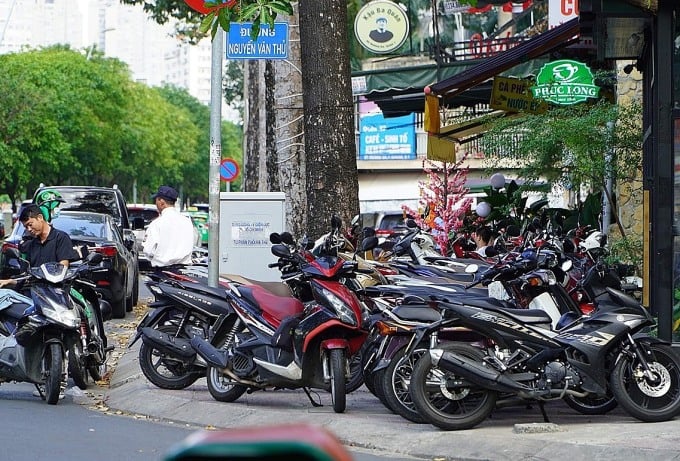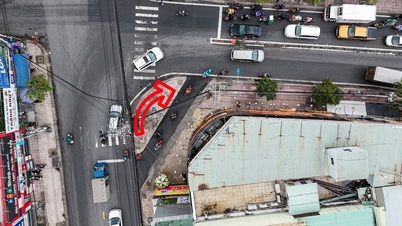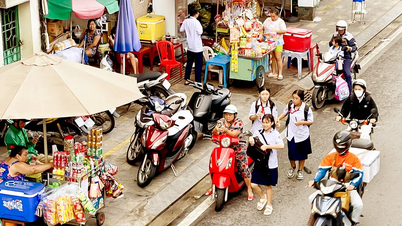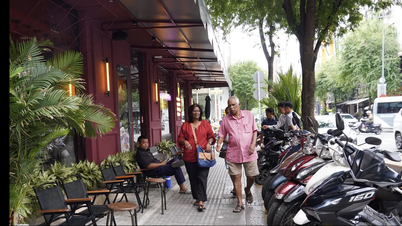Urban order forces cannot check sidewalks 24/7, so Ho Chi Minh City can hire businesses to organize and supervise toll collection, according to experts.
"The city's policy of collecting fees for using roads and sidewalks is reasonable, but it is difficult to implement effectively without simultaneously checking and punishing encroachment cases," said Dr. Du Phuoc Tan, Ho Chi Minh City Institute for Development Studies (HIDS) at a workshop on sidewalk management and exploitation in the area on August 30.
At the end of July, the Ho Chi Minh City People's Committee issued a decision to collect fees from part of the roadway and sidewalk in eligible locations from September. The leased roads must ensure conditions of having a minimum width of 1.5 m for pedestrians and two lanes for cars in one direction.
Currently, the specific fee has not been announced, but in the draft, the Department of Transport has proposed a rental fee of 50,000-350,000 VND per square meter for parking space per month. The rental price is 20,000-100,000 VND per square meter for other activities.

Motorbikes lined up on the sidewalk, blocking the pedestrian path on Nguyen Van Thu Street, District 1. Photo: Gia Minh
According to Mr. Tan, the characteristic of sidewalk economy is flexibility, the same location can have many traders at different times from early morning to late at night. Therefore, the force of officials working during office hours is not capable of monitoring the use of sidewalks 24 hours a day.
Meanwhile, once the fee is collected, the city must ensure that those who pay will have their rights protected and, conversely, must have measures to punish illegal use. Otherwise, it will be difficult for people to agree with the policy of collecting sidewalk fees.
"The estimated revenue from road and sidewalk usage fees is more than 1,500 billion VND per year, so Ho Chi Minh City can use a portion to hire a business to supervise on behalf of the government," Mr. Tan commented.
Specifically, this expert believes that the city can establish a company to manage and exploit the urban sidewalk fund, operated by private enterprises or public service companies. This unit will sign contracts with districts, on behalf of the State to manage, supervise, and monitor the sidewalk leasing process, in conjunction with functional units to punish cases of encroachment.
Part of the revenue from the sidewalk will be paid to the company to operate the monitoring and supervision system. The remaining amount will be paid to the budget and retained for districts to annually beautify and improve the sidewalks.
Mr. Nguyen Ngoc Bich, Deputy Head of the Urban Management Department of District 4, also said that in reality, drawing up fines for sidewalk encroachment for trading is difficult because violators do not cooperate and refuse to provide information.
"I once proposed to deduct a portion of sidewalk fee revenue to increase income for urban order management forces, but it was not implemented. Because according to regulations, all revenue from fees and charges must be paid to the budget," he said.
Meanwhile, Associate Professor Huynh Quoc Thang (University of Social Sciences and Humanities, Ho Chi Minh City) said the city needs to thoroughly apply technology to effectively monitor sidewalks, for example through a camera system. Because if managed by humans, it is unknown how many are needed to monitor thousands of roads.
Ho Chi Minh City has more than 4,800 roads with a width of 5 meters or more, of which nearly 2,600 have no sidewalks. Spontaneous trading and markets on sidewalks and on the road are common, affecting traffic and urban aesthetics.
The policy of collecting road and sidewalk fees aims to reorganize the order of sidewalks and roads as well as meet the essential needs of the people. The implementation also requires promoting the application of technology such as data digitization; building software for licensing and fee collection; doing online procedures to reduce manual work...
Viet Duc
Source link



![[Photo] Keep your warehouse safe in all situations](https://vphoto.vietnam.vn/thumb/1200x675/vietnam/resource/IMAGE/2025/10/1/3eb4eceafe68497989865e7faa4e4d0e)
![[Photo] President of the Cuban National Assembly visits President Ho Chi Minh's Mausoleum](https://vphoto.vietnam.vn/thumb/1200x675/vietnam/resource/IMAGE/2025/10/1/39f1142310fc4dae9e3de4fcc9ac2ed0)


![[Photo] Hanoi morning of October 1: Prolonged flooding, people wade to work](https://vphoto.vietnam.vn/thumb/1200x675/vietnam/resource/IMAGE/2025/10/1/189be28938e3493fa26b2938efa2059e)






![[E-Magazine]: That place is so passionate that it makes your heart flutter](https://vphoto.vietnam.vn/thumb/402x226/vietnam/resource/IMAGE/2025/8/22/ac7c83ddf6dc43a49a177f8f8bc2262d)























































































Comment (0)